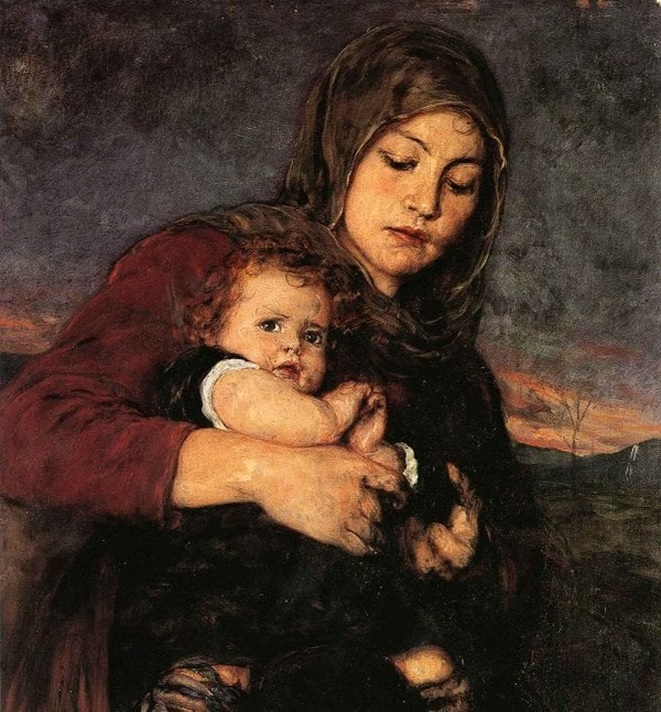Mothers cover up the misdemeanors of their children
14 July 2023‘Someone was talking disparagingly about the faults of another person, and he [Saint Païsios} said: “A mother covers up the misbehavior of her child and doesn’t make it public. Christians should do the same for other people”’.
He’s been rightly called the saint of love- though there aren’t any saints for whom love isn’t the foundation and substance of their life. How could this be otherwise when God himself is love, which means that those who are made in his image and likeness strive to make love a possession of theirs in life. Didn’t the Lord himself confirm and reveal that he considered love the hallmark of a true disciple of his? ‘By this will everyone know that you are my disciples: if you have love among yourselves’. Even if people have all the virtues in the world, if they don’t have love they have nothing. Because they’re missing the thing that gives meaning to the virtues; they’re missing God himself. So the great Saint Païsios has been called the saint of love in our time. I’m moved when I remember an encounter I had some years ago with a now departed Athonite hieromonk, whom we visited with a group of young people at the dependency of his monastery in Attica. He’d known Saint Païsios very well. One of the young men asked: ‘Elder, what was it about Saint Païsios that you’d say was most characteristic?’. The answer of the late monk was immediate and automatic: ‘His love’. Elder Païsios had all the virtues, but most of all he had love, the sacrificial love of Christ which tears at people for the sake of others.

This love is highlighted in the above instance. The saint takes as his premise the behavior of a mother towards her children: she’s prepared to justify and cover up whatever they’ve done. Because she considers them her flesh, a part of her. How can people in their right minds turn against themselves? And the love of a mother is a perfect example of God’s love for us. A partial example, it’s true, because God’s love surpasses even that of a mother; the love of God for us knows no bounds. As the saints point out, nowhere in scripture does God reveal the sins of one person to others. He always covers them up, justifies them, waiting patiently for their conversion and conscious repentance. In the prime example of repentance, the parable of the prodigal son, the only thing that God, the father, does for his estranged son is to wait for him with love. It was this love which moved the prodigal to repentance when he began to feel the pain of being orphaned. And when he returned, humbled and ashamed, to his father’s house, his father waited for him without saying anything. He didn’t chastise him but simply opened his arms wide in order to restore him to where he’d once been. Moreover, what does the Lord who takes away our sins do on the cross? He tries to vindicate us before his heavenly Father: ‘Father, forgive them for they know not what they do’. Our sins are due to our ignorance.
And doesn’t the whole of Patristic tradition proclaim this? The action of love according to the model of that of the Father always calls upon us to cover up for other people. Covering up in the sense of not offending them, not making fun of them, not mocking them, not despising them. And if, on occasion, we have to reveal an error or a sin, this should be about the act, not the person, so that we can help them to repent. We distinguish between the person and the sin, as the Lord taught in the case of the woman taken in adultery. ‘I do not condemn you. Go, and from now on, sin no more’. The holy fathers in the Book of the Elders make the point that if you cover up the error and sin of your neighbor, God will do the same for you.
So Saint Païsios worked along the same lines as Christ, the holy Apostles and the holy Fathers of the Church. And he tells us that we should deal with other people with the sacrificial love of a mother. We should cover up other people’s mistakes and not make them public knowledge. Because such love unites us with the river of God’s love and brings us to the point of continuous contact with him. ‘God is love and those who dwell in love dwell in God and he in them’. And if this attitude is a given for Christians as regards individual people, how much more is it true as regards the Church itself, the living body of Christ, our own mother. How many Christians slip easily into indiscretion and the ungodly state of slander concerning for example the shepherds of the Church or the revelation of what we suppose are its defects. Not that we shouldn’t point out any human errors or omissions on its part, but we should do so appropriately. Our aim should be rectification, not the expression of our own bad intentions. And when we act indiscreetly towards the Church in this way, we do so also towards ourselves. Because we are, supposedly, members of the Church, and every other member, clergyman or not, is Christ concealed.






